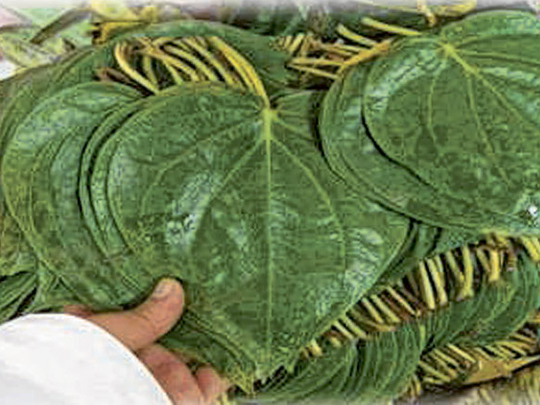
Abu Dhabi: Two shops illegally trading in banned substances ‘paan' (betel leaves) and ‘neswar' (dipping tobacco) were recently raided by the Abu Dhabi Municipality, a top official said on Monday.
The shops were licensed as traders of electronic goods and mobile phones, but used their premises to secretly trade in the two banned substances, said Khalid Al Rumaithi, director of public health at the municipality.
Four tonnes of the banned substances, which are typically sold to users for Dh1 to Dh3 apiece, were confiscated. Since the raid, the municipality has stepped up its crackdown on the trading of these substances, Al Rumaithi said.
"Paan and neswar are a threat to public health and safety, which is why the municipality has prohibited the trade of these substances. Reliable medical reports have shown repeatedly that paan addicts are more vulnerable to oral and lung cancer," he said.
Paan and neswar are traditionally made from betel and tobacco leaves rolled with lime paste, dried fruits, wood ash, etc.
Various harmful substances are also added to betel and tobacco leaves when paan or neswar is prepared, such as dyes, pigments, colouring agents, and harmful flavours that violate health standards, Al Rumaithi said.
He also said that the pots and vessels used to process the paan and neswar were primitive, rusty and unsterilised, and this violates the code of public hygiene.
When chewed, the paan and neswar mixtures also produce a red juice which must be spat out from time to time. Al Rumaithi said this stains the roads and buildings in the city and mars the appearance of the city, especially along Khalifa, Hamdan and Electra streets.
High risk
Health risks of ‘paan' and ‘neswar' exceed those of smoking, Dr Ravi Arora, internal medicine specialist at New Medical Centre, told Gulf News. "This is because many cancer-causing substances are taken in and remain in the mouth for a sustained period."
Hefty fine
Violators of the ban on paan and neswar trade could incur hefty fines up to Dh10,000, Khalid Al Rumaithi told Gulf News.
"The matter can also be transfesrred to municipal courts, and repeat offenders could be jailed and even deported," he said.
Do you know of anyone selling paan? Have you reported them to the authorities? Tell us at readers@gulfnews.com or fill in the form below












